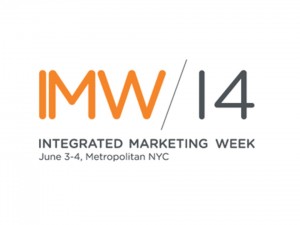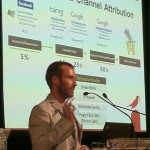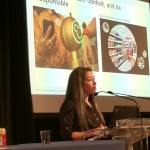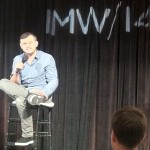According to The DMA, no single channel can win out anymore because today, it’s about being wherever customers are, giving them relevant messages, and making sure that each interaction is intelligently connected to the next. All that means delivering great customer experience across any and every channel: web, social, mobile, broadcast, email, in-store, outdoor and beyond.
 That's how the DMA positions the content for their annual Integrated Marketing Week conference, and their speakers provided example after example about how that view rings true across industries. Technology and regulation are changing many aspects of the market's dynamics, but it's customer behavior and expectations that provide some of the greatest impetus for what integrated marketing means today. What's more, data and analytics are providing the insights necessary to confidently execute on an integrated basis. Here are a few examples of how it all plays out:
That's how the DMA positions the content for their annual Integrated Marketing Week conference, and their speakers provided example after example about how that view rings true across industries. Technology and regulation are changing many aspects of the market's dynamics, but it's customer behavior and expectations that provide some of the greatest impetus for what integrated marketing means today. What's more, data and analytics are providing the insights necessary to confidently execute on an integrated basis. Here are a few examples of how it all plays out:

Integrated marketing needs great content. Or as Didit's Kevin Lee put it, great content compounds - like a bank account, making it hugely important for integrated marketing. The compounding, of course, is a result of how easily people can share content and social media's role in creating a culture of sharing in today's market. Online Marketing Institute's Aaron Kahlow connected the dots succinctly by saying that a social media strategy is meaningless without a content strategy.
It turns out that sometimes great content comes as a result of a marketing collaboration between data scientists and creative types. The Martin Agency's Lauren Tucker and Cliff Sorah highlighted how their data-driven creative process with their client, Ryan Smedstad at Penske delivered moving results.
In separate sessions, Time Warner Cable's Sean Coar and Margo Kornfeld both provided great perspectives on using data in marketing. In her panel discussion, Margo held that integrated marketing is all about the data. For Sean, data is the new media that informs marketing decisions, which he illustrated with research points on multiscreen viewers that shows how their habits are profoundly changing the dynamics of marketing as we know it.

So is data-driven marketing the key to good integrated marketing? Speaker after speaker drove that point home. Yet as big data in marketing matures, it appears that context has emerged as an important moderator in separating the hype from reality in big data. In fact, Forrester Research's Fatemeh Khatibloo offered up four C's to provide a framework for considering how best to harness the potential of big data for mareketing: culture, competency, capability and context. All four are important moderators, but she advised the audience to be smart, consider context and be responsible when marketing with big data.
And just as content and big data play key roles in integrated marketing, it's equally important for marketers to evolve their mindsets and double check what we may take for granted.

BCBSNC's Michael Parkerson vividly illustrated how demographic-based segmentation falls flat by showing how an affluent Englishman aged 64 with two adult children accurately describes both the Prince of Wales and Ozzy Osbourne.
That point was reinforced with an articulate description of how 6Sense's Amanda Kahlow and Cisco's Stoddard Vandersteel use both descriptive and behavioral data for drive better engagement for their B2B market.
Atttribution has always been of interest to marketers, and perhaps even more so when faced with the need for integrated marketing. AARP's Peter Zeuschner believes that last-touch attribution is overrated, and integrated marketers get the biggest impact from working the mid-funnel. For Scholastic's Joe Torczon, it goes beyond attribution and it's more a question of testing and measurement for getting the best results.

Ultimately, integrated marketing today is all about getting into the details. Gary Vaynerchuck, in his keynote address, advised the audience to talk strategy but not without the intimate knowledge of a practitioner. Why? He says that's where all the opportunities are. He also believes the internet is squeezing everybody out of the market that does not add value, which is an interesting point considering how many industries have been transformed by the internet.
The digital nature of the internet and all the online processes enabled by it clearly mean that data and analytics are where the future of marketing lies, but it's not simply having data - it's also a matter of what you do with it and the mindset changes needed to realize the potential. Gary's views shared in his keynote address underscore that thought with a few succinct points that I shared during the show via Twitter:
- Want to innovate? Don't try to be like Birchbox or Uber if you don't want to act like them.
- Change agents in large organizations without management support to effect change will fail.
- Organizations need to understand that they are in the media business - if not, they will fail.
So that's what integrated marketing means today. What do you think?

4 Comments
Great article on CRM/ CEM!
Thank you so much! I enjoyed the conference very much and the speakers were amazing. This blog post was a pleasure to write.
JB
This is very interesting, You are a very skilled blogger.
I have joined your feed and look forward to seeking more of your wonderful post.
Also, I have shared your web site in my social networks!
Thank you for your kind words! Please remember that you can click on that button to the right of the posts and subscribe, so you can get posts delivered to you via email as well.